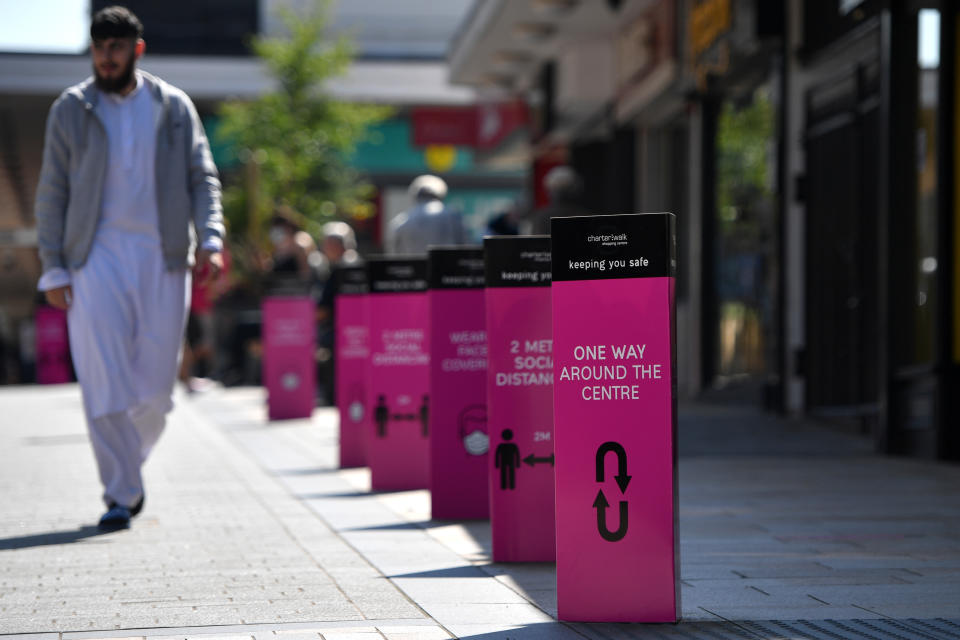Coronavirus lockdown: What you can and can't do from tomorrow and where you can and can't do it
Restrictions to prevent the spread of coronavirus have been changed again following concerns that infection rates are rising in some areas.
On Friday afternoon, Boris Johnson said planned reopenings of some ‘higher-risk settings’ have been postponed for a fortnight. It followed a government announcement on Thursday night of tighter restrictions in areas of the north west of England, including Greater Manchester and parts of east Lancashire and West Yorkshire.
So what can you do from 1 August and where can you do it? Yahoo News UK guides you through it:
What reopenings have been postponed and when to?
In a press conference on Friday, Johnson said the openings of some “higher-risk settings” — due to take place on 1 August — have been postponed for at least a fortnight.
The announcement means casinos, bowling alleys, skating rinks and other close-contact services must stay closed until 15 August.
The move also means indoor performances will not resume, along with pilots of larger gatherings in sports venues and conference centres.
Plans to allow wedding receptions of up to 30 people have also been postponed.
Where will the rules apply?
The rules apply across England, while Scotland and Wales have their own coronavirus restrictions in place.
However, on Thursday night the government announced that people from different households in Greater Manchester, parts of east Lancashire and West Yorkshire would be banned from meeting each other indoors from midnight.

The new restrictions apply to Greater Manchester, including the City of Manchester, Trafford, Stockport, Oldham, Bury, Wigan, Bolton, Tameside, Rochdale and Salford.
They also apply to Blackburn with Darwen, Burnley, Hyndburn, Pendle and Rossendale in Lancashire, and Bradford, Calderdale and Kirklees in West Yorkshire.
Similar restrictions will also apply to Leicester, which saw the first so-called “local lockdown” imposed on 29 June, but all local restrictions currently in place in the neighbouring borough of Oadby and Wigston are set to end.
The DHSC said that from Monday, restaurants, cafes, bars and hairdressers in Leicester can open again in line with the easing of restrictions across the rest of the country on July 4.
Leisure centres, gyms and pools will remain closed but cinemas and museums will open and religious ceremonies will be able to take place, it added.
But Health Secretary Matt Hancock said restrictions on social gatherings imposed on Greater Manchester, East Lancashire and West Yorkshire will also apply to the city of Leicester.
So what is it okay to do?

Other than the postponement of planned reopenings — and the changes in certain areas — other rules remain the same.
But Johnson warned that if people don’t follow the rules and behave safely, the government may need to go further.
He said: “At this stage, we are not changing the rules on social contact nationally.
“I don’t want to tell people to spend less time with their friends. But unless people follow the rules and behave safely, we may need to go further.”
What about face coverings?
On Friday, the Prime Minister also announced the extension of the requirements on wearing a face covering indoors, adding museums, galleries, cinemas and places of worship to the list of places where you have to wear one.
He said: “We will also extend the requirement to wear a face covering to other indoor settings where you are likely to come into contact with people you do not normally meet, such as museums, galleries, cinemas and places of worship.
“We now recommend face coverings are worn in these settings, and this will become enforceable in law from August 8.

Will this affect people going to work?
Following the addition of restrictions in the north west, Hancock said people can still travel “for work purposes”.
Asked on Friday what he would say to people who apprehensive about returning to the office after home working, Johnson said: “I want to see people discussing with their employers whether they can work from home. Lots of people can work from home.
“A lot of people discover that it does work. But if employers think, and employees think, that actually to get in, to be productive, you need to be at your place of work then that’s a very, very important consideration.
“And it is safe to get into a Covid-secure workplace and people should understand that and that is our guidance.”
Prof Whitty added: “But I think we should just be really grateful that huge numbers of employers have put an awful lot of effort into trying to make workplaces Covid-secure.
“It’s absolutely essential that everybody does that, but the great majority are, and then when that happens people stick to the guidance and the rules they’re given.”
Coronavirus: what happened today
Click here to sign up to the latest news and information with our daily Catch-up newsletter




